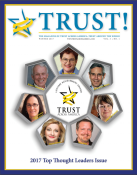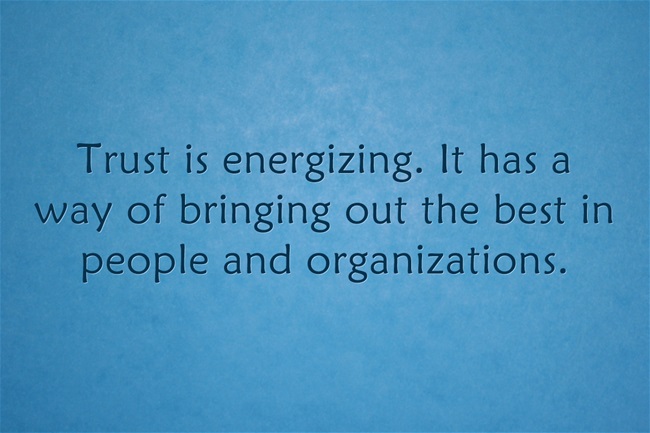By Linda Fisher Thornton
How transformational is the power of trust in organizations? It increases capacity and improves performance. It improves work satisfaction and quality of life:
“Compared with people at low-trust companies, people at high-trust companies report: 74% less stress, 106% more energy at work, 50% higher productivity, 13% fewer sick days, 76% more engagement, 29% more satisfaction with their lives, 40% less burnout.”
Paul J. Zak, The Neuroscience of Trust, HBR
Trust is no longer considered a “nice to have” element in the effective workplace. It is a “must have” element that energizes the whole organization. Working in a safe high-trust environment, people can do extraordinary things.
On Monday I received a Trust Across America 2017 Top Thought Leaders in Trust award an d a Lifetime Achievement Award. It is quite an honor to be recognized along with so many notable champions for trust.
d a Lifetime Achievement Award. It is quite an honor to be recognized along with so many notable champions for trust.
See the short articles contributed by the Trust Across America 2017 Top Thought Leaders in Trust: Lifetime Award winners in the latest issue of TRUST! Magazine. This quote is from my piece on What Trust Means to Me on page 13:
“When people work in a high trust environment, they experience the freedom and space to excel that leads to nothing less than organizational magic.”
![]()
Learn To See Through All 7 Lenses of Ethical Responsibility
Includes case examples and questions.
Click the book cover for a preview.
Unleash the Positive Power of Ethical Leadership®
©2017 Leading in Context LLC




Reblogged this on Gr8fullsoul.
LikeLike
Cam, Thanks so much for articulating the continuum of trust!
LikeLike
Trust is often called an attitude, a propensity, a cognition, an intention, and/or a willingness to act. But, properly, trust is identified by the Theory of Reasoned Action as all of these elements — and is, ultimately, the relinquishing of one’s control and compliance with another in the expectant hope that the other party will honor the duties of a perceived social contract.
Trust is often called “the glue” holding relationships together. It is almost universally described as being on a continuum . . . . . and that continuum ranges from minimal (and often dysfunctional) compliance to stewardship ownership of the organization’s mission and a willingness to go the extra mile in pursuit of the organization and its leader’s action plan.
Despite the thousands of articles about leadership and trust, there continues to be a “fog” around its definition and trust and trustworthiness are often interchanged in the nomenclature as if they were the same thing . . . . . which they are definitely not!
LikeLike